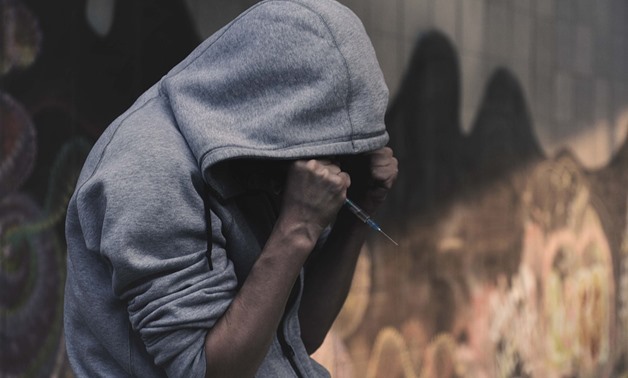
FILE - Youth holds a syringe – Pixabay/rebcenter-moscow
CAIRO – 12 April 2018: MP Khaled Abdel Aziz, deputy of the Parliament’s Housing Committee, called for carrying out drug tests on students in schools and universities, following a study on drug abuse among students published by the Health Ministry on Wednesday April 11.
Abdel Aziz said that the spread of drugs among children of ages starting as young as 11 years old seriously endangers youth’s future.
In a study conducted by the Health Ministry on a sample of more than 10, 000 students, it was found that over 24 percent of students tried drugs, according to Mona Abdel Maksoud, head of the General Secretariat of Mental Health.
The study found that 20 percent of school students who abuse drugs get them from schools or places around schools, including clubs, pharmacies and cafes. Abdel Aziz said that it is illogical to test school bus drivers for drugs without testing students as well.
Over the course of the last three years, the Fund for Drug Control and Treatment of Addiction (FDCTA), a subsidiary of the Egyptian Ministry of Social Solidarity, executed random drug testing campaigns on school bus drivers.
The campaigns aimed to test 4,000 school bus drivers during the 2016/2017 school year. About 105 drivers reportedly tested positive for drugs.
Article 76 of Traffic Law no. 121 of 2008 states that any highway driver that tests positive in a random drug test will have their license withdrawn for a period no more than two years.
Violators will be referred to the Public Prosecution, punished with imprisonment for a period of no less than two years, and fined LE 10,000 ($554.60). Should a road accident result in a fatality, the perpetrator will face up to five years in prison.
In January 2018, Tamer Hosny, member of the governmental Anti-Addiction Treatment Fund, said that about 7.7 percent of high-school students are on some form of narcotics.
Most young addicts are attracted to drugs because of curiosity, which compels them to discover “strange stuff”, Hosny said in an interview with “Kol Youm” (Every Day) program on ON E, explaining that Voodoo and Strox users are prone to develop severe mental illnesses, such as schizophrenia and paranoia.
“More powerful than drugs”
The Egyptian Liverpool footballer Mohamed Salah participated in the "Say No to Drugs" campaign, adopted by the Ministry of Social Solidarity and the Fund for Drug Control and Treatment of Addiction (FDCTA), to encourage Egyptian youth to stay away from all kinds of drugs.
Minister of Social Solidarity Ghada Waly stated that the campaign's Facebook video exceeded 5 million views in just 72 hours.
“Some 88 percent of the viewers were between 18-35 years. Facebook, Instagram and Youtube videos’ have been watched for 8 million and 400,000 times, shared for 23,000 times and liked by 359,000 users,” Waly added.
"Salah’s anti-drugs campaign in 2017 has increased the number of 'consultation and treatment for drugs' calls by five times," Wali said in June.
"The number of daily calls to the hotline reached approximately 500 calls, aiming at seeking consultation and treatment for drugs. Previously, the hotline had received 100 to 150 calls per day," Wali explained.
In 2016, youth-beloved actor Mohamed Ramadan participated in a campaign sponsored by the ministry. In the advertisement, Ramadan reviews the future of a person, reportedly his friend, who could not resist drugs, and how drugs stopped him from achieving his dreams. Ramadan was honored by Wali for his anti-drugs efforts.
In September 2017, Wali signed a conference cooperation protocol with Makram Mohamed Ahmed, head of Egypt's Supreme Council for Media Regulation, to counter the misuse of substance abuse and addiction in the media.
During the conference, Wali stated that the protocol aims to take all the necessary steps to activate an ethical code relating to the treatment of substance abuse and addiction. Those codes were decided in 2015 under the patronage of President Abdel Fatah al-Sisi.
"A total of 5,000 scenes featuring smoking and drug abuse have been aired in TV series in the last three years during the holy month of Ramadan," Wali said, pointing out that this is considered a serious attack against the country.
She stated that the Ministry of Social Solidarity recorded 2,428 scenes of smoking and drug abuse in the Egyptian drama aired during Ramadan 2017, in a total of 56 hours and 33 minutes.

Comments
Leave a Comment